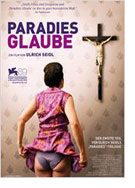

Opening 21 Mar 2013
Directed by:
Ulrich Seidl
Writing credits:
Ulrich Seidl, Veronika Franz
Principal actors:
Maria Hofstätter, Nabil Saleh, Natalya Baranova, Rene Rupnik
The second of Ulrich Seidl’s trilogy Paradies Glaube (Paradise: Faith) deals with the themes religion and sex but also with brutality, mentality and physicality. He provokes with black humour and beautifully arranged pictures by camera team Wolfgang Thaler and Ed Lachman.
Anna Maria, a medical technician and staunch Catholic, lives on her own, spending her vacation trying to force her faith onto strangers. With a foot-high statue of the Virgin Mary she goes to the outskirts of Vienna telling immigrants about her version of paradise and Christ the Redeemer. In the cramped apartment of a compulsive hoarder (“Messie”) she makes the middle-aged man kneel down for prayers whilst he doesn’t quite know what she is talking about. This is grotesquely funny but also cruel and disgusting.
When returning home we see her taking off her dress and flagellating herself or shuffling through the house on her bare knees begging Jesus to forgive all sinners: “So many people are obsessed by sex. Deliver them from this evil”. Once a week she invites her Bible friends into her home for mutual praying and singing. Together they promise to bring Catholicism back to Austria. Her self-righteousness is quite annoying. Anna Maria’s only compassion is HER Jesus, her one and only love. She sings to him, she kisses his picture “good night”; she longs for love and even takes the wooden cross under her bed covers.
Her idea of paradise gets spoiled when Nabil, her Muslim husband, returns after two years in Egypt. An accident left him paralysed and Anna Maria feels obliged to look after him. Her attitude is so cold and indifferent towards him that it is chilling to watch. Where is her human compassion? Nabil, who at first is friendly and polite, gets more and more frustrated by being treated like a stranger. Aggressively he demands his rights as a husband. When she still ignores him he destroys the numerous crucifixes and statues. She retaliates, and the two of them embark on a veritable war of sex and religion. It is difficult to have sympathy with either of them.
With provoking and shocking scenes the filmmaker shows the darker sides of a religious obsession with a documentary-like approach. Unfortunately many repetitive scenes let the film drag on a bit. The main character is strongly portrayed by the well-known theatre actress Maria Hofstätter. Nabil Saleh, an untrained actor, is so convincing in his role that I was surprised to learn he is not a paraplegic. It is his first time in front of a camera. (Birgit Schrumpf)